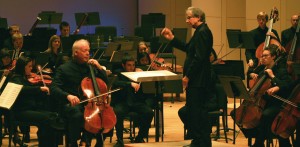
Bach Moment at New World Reaffirms Gift of Music
After cellist Lynn Harrell played Tchaikovsky’s Rococo Variations with the New World Symphony on Saturday night at the Lincoln Theatre, he came out for a solo encore. And he introduced it this way:
“I can’t tell you how exciting it is to be playing with these young musicians, who are just starting out on the very long journey of their musical careers,” he said, then played a pair of bourrées from the Third Cello Suite of J.S. Bach in their honor, and in that of NWS conductor Michael Tilson Thomas.
It was a lovely moment, and not just because he played the Bach so well. It was lovely because it encapsulated in that one moment the promise of youth, the achievement of age, and above all the timeless continuum on which this music sits.
A Canadian journalist named Eric Siblin published a book late last year about his personal discovery of the Bach cello suites, and one of the things that comes through is his astonishment at the music’s power to move him, nearly 300 years after it first saw the light. We don’t know precisely when they were written, nor do we know precisely for what instrument, though the sixth suite was likely written for a five-string violoncello piccolo, and the fifth also exists in a version for lute.
And here it was again, alive, just as fresh as it was when it first was composed. It’s true that other great art from the past continues to have its power, and you can name a number of suitable examples: dramas by Aeschylus and Shakespeare; poetry by Li Po and Robert Browning; etchings by Durer and paintings by Goya. But I don’t think there’s anything quite so immediate as music, which is more like seeds of plants that come to life with water, plants that open as they have opened since the beginning of creation, and that will continue to do so until the end.
It’s hard to write about without sounding mystical or pretentious. Harrell does a better job on his Website, where he has a blog in which you can read about his experiences, and the sense you get is of a man who is profoundly grateful to be a musician, and to have been able to take part in so many spiritually nourishing events throughout his life.
Another thing about Saturday night’s concert was the sheer level of muscle and energy in the performances of Beethoven’s Seventh Symphony and Steven Mackey’s Eating Greens. That has much to do, of course, with the New World being an ensemble of young people. But it also had to do with the vigor of the two older men on stage, Harrell and Tilson Thomas, who are both in their mid- to late 60s.
If proof ever was needed that music keeps you young, you could see it in the joy on Harrell’s face as he leaned into the violin section to sing along, or in Tilson Thomas as he moved around on the podium, at several points almost jumping up and down as he urged his players on.
It’s worth remembering that the Beethoven symphony was written in 1812. That’s a very long time ago indeed, and yet here were young and older people coming together to revive it once again, to make it new, and to continue the task of passing along this music, this great gift of humanity, to fresh audiences.
Lynn Harrell knows what that’s all about, and in his playing of Bach, he told us so, without words.
Recent Content
-
Artsarticle ·
-
Artsarticle ·
-
Artsarticle ·

